吳漢忠老師實驗室
-

- 專長:Cancer Research, Cell Biology
- 信箱:hcw0928@gate.sinica.edu.tw
- 電話:02-2789-9528
- 位置:R411/ICOB
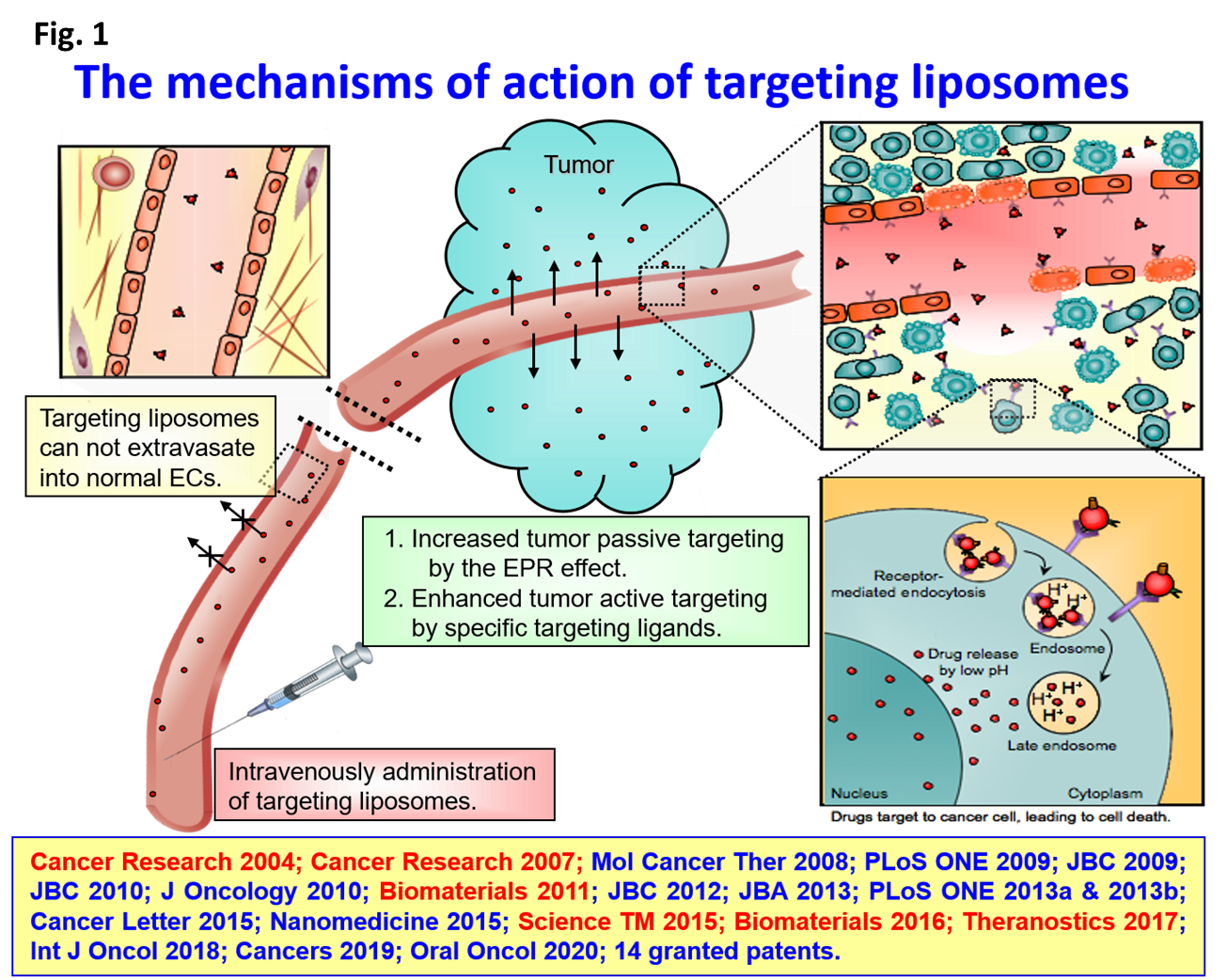
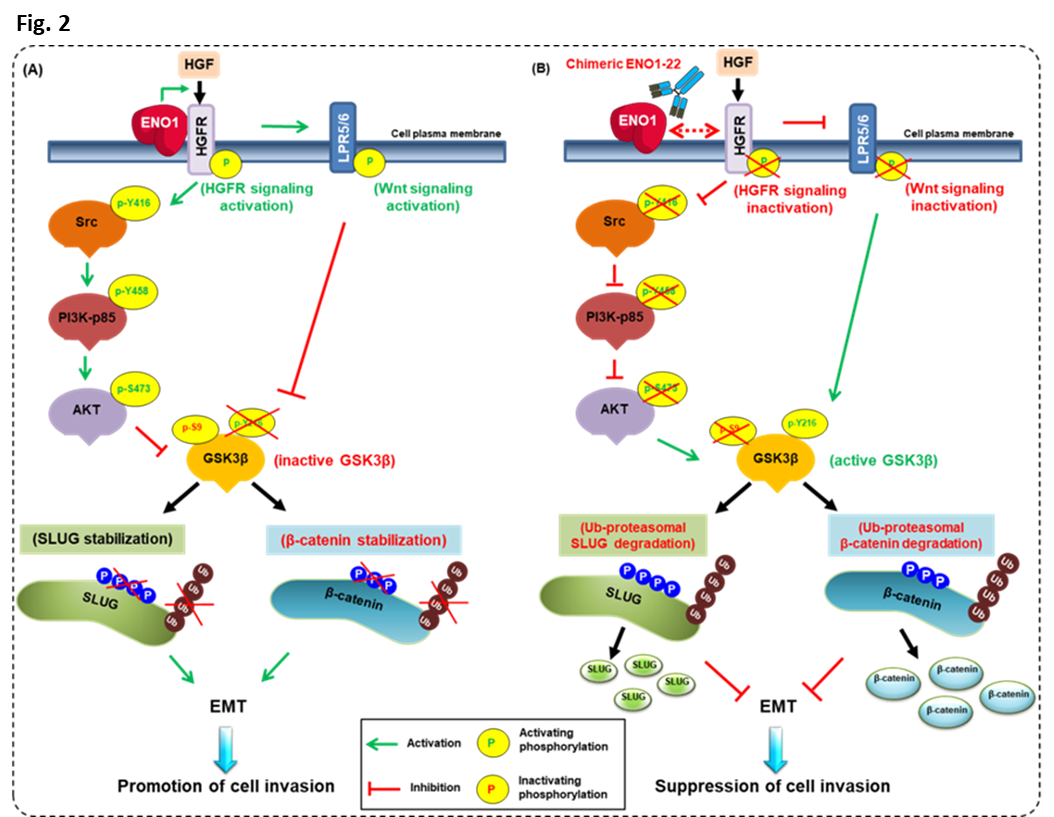
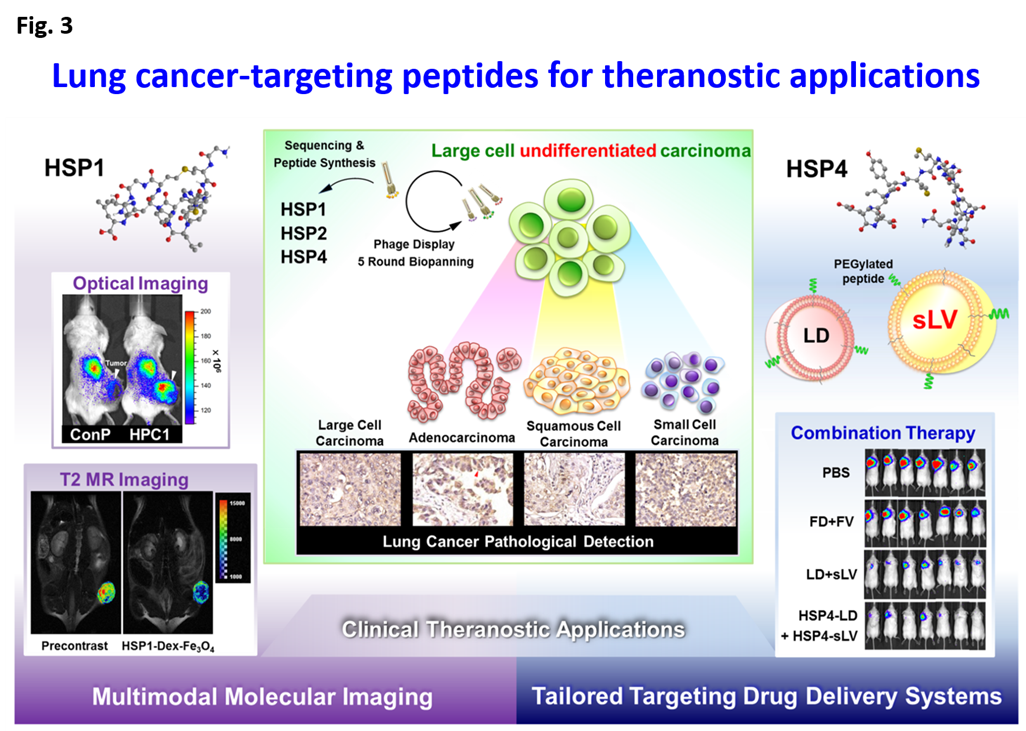
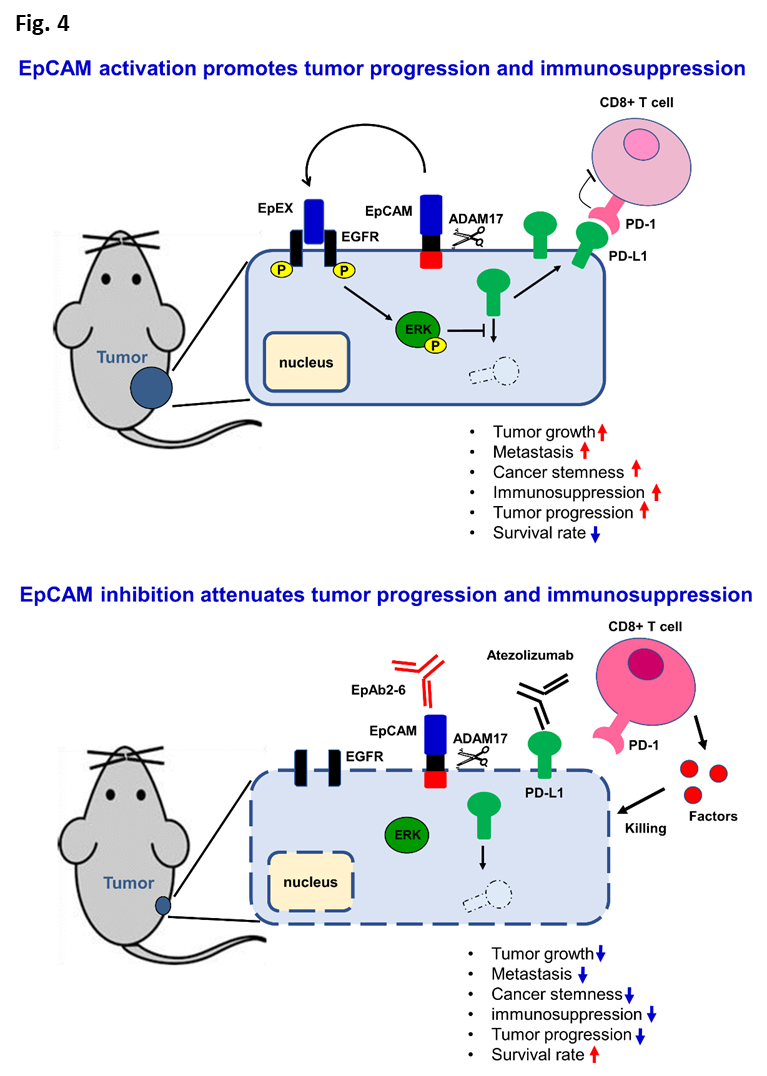
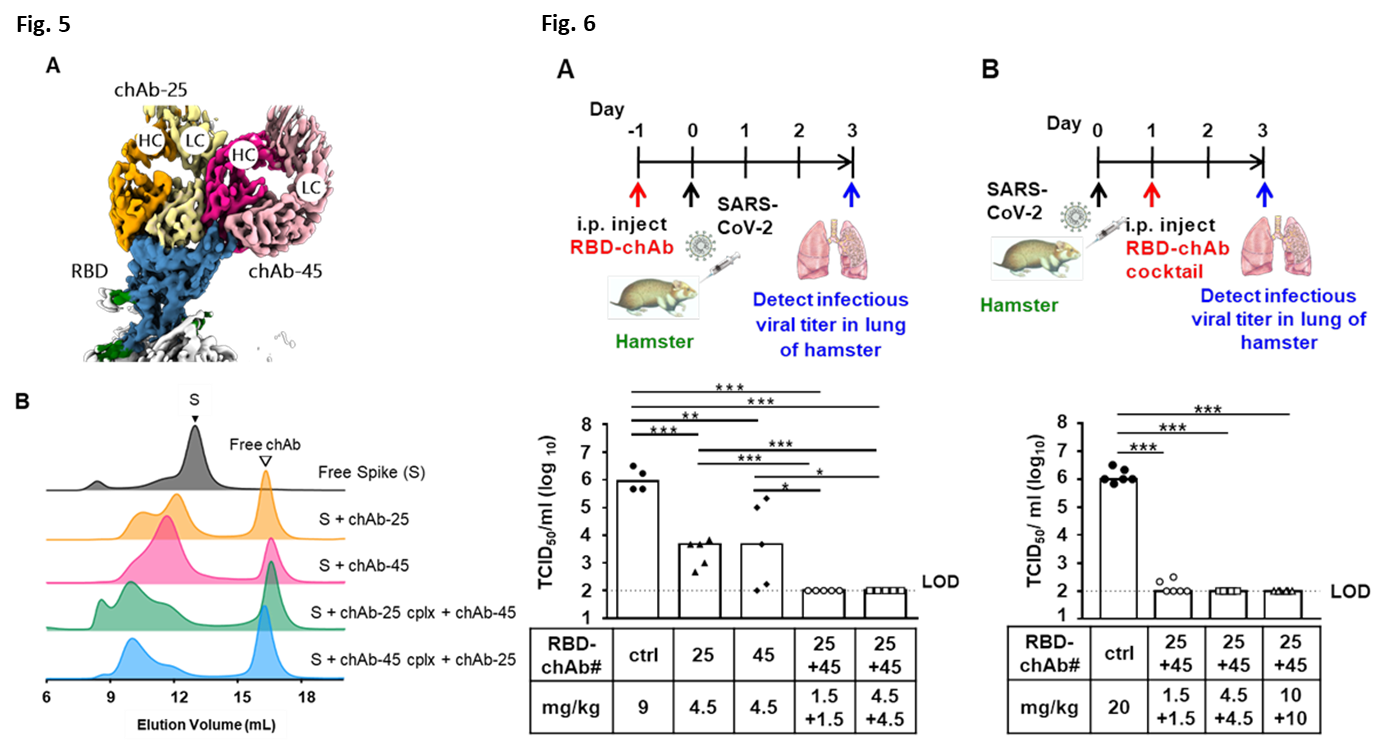
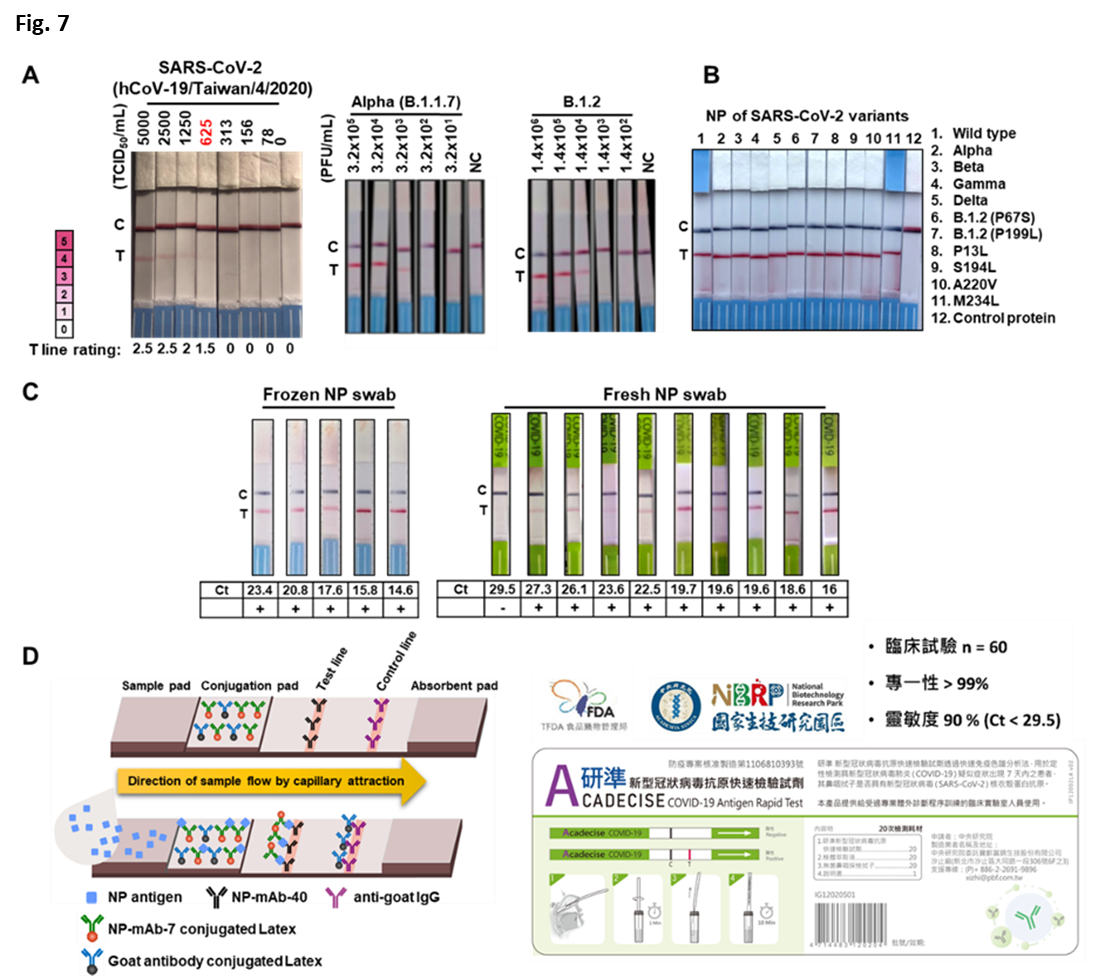
癌症之標靶蛋白及標靶治療與影像研究
醫學界對於癌症的治療,至今仍然存在著很大的瓶頸。為了避免抗癌藥物造成正常組織毒性而產生的副作用,常常只能給予次適當濃度的抗癌藥物,因此伴隨著抗藥性以及癌細胞轉移的發生,最終往往導致治療失敗。根據相關學術期刊以及我們的研究結果皆顯示抗癌藥物極易進入正常組織,卻難以進入有高組織間質液壓(IFP)的腫瘤組織。為了解決這些問題,本實驗室發展出標靶抗癌藥物傳輸系統(圖1)。我們將標的配體與帶有抗癌藥物的微脂體連結,標的配體(targeting ligand)能自動導向癌細胞或腫瘤組織,便能將高劑量的化學藥物專一性攜至腫瘤組織,可以讓癌細胞暴露於高劑量的抗癌藥物中,大大地提高藥物的抗癌能力,從而減少藥物對正常組織損傷的副作用。並且,我們將標靶胜肽或抗體接合至量子點或超順磁氧化鐵奈米粒子,進行活體腫瘤造影分析。運用螢光或MRI系統分析,我們發現標靶胜肽可更為精準、有效率的將顯影試劑運送至腫瘤組織而加強成像。相關研究已發表於重要國際期刊,包括Cancer Letters 2015、Nanomedicine 2015、Science Translational Medicine 2015、Biomaterials 2016、Theranostics 2017、 Oral Oncology 2020 及Cancer Research 2021等。
腸癌是全世界發生率最高的癌症之一,本實驗室已成功地篩選專一性結合腸癌之新穎標的胜肽pHCT74,相關研究成果已發表於頂尖轉譯醫學期刊(Science Translational Medicine 2015),受到審查委員高度肯定,並認為對於癌症治療是一重大突破。此外,我們也已成功鑑定出pHCT74胜肽分子靶標蛋白是α-enolase (ENO1),研究發現ENO1會與HGFR結合,進而通過HGFR-Src-PI3K-AKT-GSK3β-SLUG和HGFR-WNT-GSK3β-SLUG信號軸促進肺細胞侵襲、腫瘤轉移和進展。因此,我們製備嵌合ENO1-22 (chENO1-22)的新型單株抗體(mAb),是可以與肺癌細胞表面的ENO1結合。用chENO1-22治療減少了肺癌細胞的生長和侵襲,更重要的是,chENO1-22 在異種移植模型中阻止了轉移並提高了小鼠的存活率(圖2)。這些研究結果表明,ENO1通過HGFR和WNT信號促進肺癌轉移,並引入了一種新型ENO1抗體,可用於肺癌的潛在治療(Cancer Research 2021)。
肺癌位居全世界癌症死亡率之首。我們篩選出數條能與肺癌細胞專一性結合之標靶胜肽。其中,三條標靶胜肽 (HSP1、HSP2和HSP4)對於肺癌細胞有高度的專一性與親和力,且不會與正常細胞結合。在非小細胞肺癌的動物模式中,發現HSP1、HSP2和HSP4接合的標靶微脂體具有顯著療效。在細胞株及肺癌病人組織切片的免疫染色發現這三條胜肽可以辨識非小細胞肺癌(包括:肺腺癌、鱗狀細胞癌和大細胞癌) 及小細胞肺癌(圖3)。因此,這三條胜肽可用於不同亞型 (subtype) 的肺癌病人做出最佳的治療策略,亦可發展成活體造影或組織病理學上的偵檢試劑,極具臨床潛力。此部分成果已申請全球專利,且論文已被重要的癌症治療及診斷期刊接受(Theranostics 2017)。
上皮細胞黏附因子EpCAM藉由EGFR訊息傳遞促使癌症惡化
上皮細胞黏附因子(EpCAM)於惡性腫瘤中大量表達,並促使癌症惡化,但是如何調控癌症惡化的機制仍然不清楚。我們發現EpCAM的細胞外區域(EpEX)可以藉由其EGF相似區域一結合EGFR,並且活化下游的AKT與MAPK訊息傳遞,進而抑制細胞凋亡相關轉錄因子FOXO3a的作用,同時穩定免疫檢查點蛋白PD-1的配體PD-L1蛋白之表現,最終促使癌症惡化。EpEX可以活化EGFR下游訊號ERK並增加EpCAM的受調節膜內蛋白質裂解(RIP)而生成胞內區域(EpICD)。我們發現表皮生長因子受體與MEK的抑制劑會降低EpICD的生成而且EpICD的減少會降低細胞核β-catenin的累積和缺氧誘導因子1α (HIF1α)目標基因的表現。在大腸癌的臨床檢體也發現細胞核EpICD的量與腫瘤轉移和較差預後呈現高度相關。在臨床大腸癌的檢體裡,細胞核中EpICD的累積跟腫瘤轉移與病人較差的預後息息相關,藉此推測EpICD在癌症形成的過程中扮演重要的角色。此外,利用本實驗室所研發的中和性抗體EpAb2-6可以誘導FOXO3所調控的HtrA2表現,並促使細胞凋亡的產生,也會抑制細胞核β-catenin和缺氧誘導因子1α的累積。在小鼠的轉移和原位模式(Orthotopic model)的實驗發現,EpAb2-6可以延長老鼠的存活率。EpAb2-6也可以藉由降低癌細胞中PD-L1蛋白的表現,來活化CD8+ T細胞殺死癌細胞的能力。此外,在肺癌的小鼠模型中,同時使用EpAb2-6 和PD-L1抗體Atezolizumab的聯合療法,可增加腫瘤內CD8+ T細胞的數目,並且有效抑制腫瘤的生長(圖4)。這些發現不僅更深入剖析EpCAM促使癌症惡化的分子機制,對未來臨床上治療EpCAM過量表現的癌症,也提供了結合免疫療法的新策略。這些研究發現EpCAM會藉由EGFR訊息傳遞來穩定PD-L1蛋白表現,進而使病人的腫瘤細胞逃脫免疫系統的監控。最重要的是,使用中和性抗體不僅可以抑制EpCAM的訊息傳遞,並降低癌細胞中PD-L1的蛋白表現,進而導致腫瘤細胞死亡及活化T細胞殺死癌細胞的能力。這項研究成果已發表在國際重要的癌症研究期刊Cancer Letters 2018及Cancer Research 2020。
治療和檢測 SARS-CoV-2 的抗體開發
自 2019年底新冠肺炎疫情爆發以來,SARS-CoV-2 在全球引起嚴重的大流行。研發中和性抗體是一種有希望的治療策略,它可以抑制病毒以阻止疾病進展並加速患者康復。我們已經成功研發一系列針對SARS-CoV-2 RBD蛋白的治療性抗體(chAb),其中6個抗RBD抗體對SARS-CoV-2有高度結合力,並且對SARS-CoV-2的具有中和活性。我們發現六種抗 RBD 抗體靶向 RBD 內的三個不同的非重疊epitope,低溫電子顯微鏡分析結果顯示兩種抗體分別結合於RBD不同epitope,可以運用於雞尾酒療法(圖 5)。我們進一步在感染SARS-CoV-2 的小鼠和倉鼠實驗,證明這些抗體具有預防性和治療的功效(圖 6)。隨著 SARS-CoV-2 更具傳染性的變體的出現,雞尾酒抗體療法在控制疾病和預防耐藥性方面具有相當的潛力(PLOS Pathogens 2021, JBMS 2021)。
新型冠狀病毒 RNA基因體不斷變異,在世界各地造成嚴重疫情,運用大規模而精確的檢驗的方法是防疫的重要關鍵之一。我們藉由小鼠融合瘤技術製備對抗核衣殼蛋白(Nucleocapsid, NP)之單株抗體,透過81種抗體配對分析,找出運用於側流分析法(LFIA)檢測NP抗原的最佳抗體組合。以NP-mAb-7作為捕捉抗體和NP-mAb-40作為檢測抗體,建構之快篩試劑 NP-mAb-40/7 LFIA展現最佳之特異性與敏感性。NP-mAb-40/7 LFIA 對SARS-CoV-2原始病毒株的偵測極限為 625 TCID50/mL,對多種病毒變異株亦有辨識能力,包括Alpha、B.1.2與Delta變異株與10 種以上SARS-CoV-2變異株之NP。我們進一步分析特異性,NP-mAb-40/7 LFIA不會交叉辨認MERS-CoV等5種人類冠狀病毒與20種常見人類呼吸道病原體,展現高度專一性。NP-mAb-40/7 LFIA的臨床研究 (n = 60) 結果顯示,在Ct < 29.5的感染個體中,特異性為 100%,敏感性為90% (IJMS 2021)。這些數據顯示 NP mAb-40/7 LFIA的偵測準確度具有臨床意義,因此於 2021年7月8日取得台灣食藥署之COVID-19專案製造核准 (EUA),是中研院的首例,此產品命名為「研準新冠病毒抗原快速篩檢試劑」(圖7)。
另一方面,偵測血清抗體IgG / IgM能夠依此推估判斷感染的時間先後,有助於疫情防堵與調查。因此我們在去年國際疫情爆發初期即著手與慈濟大學合作,完成新型冠狀病毒血清雙抗體IgG / IgM快速篩檢試劑之開發,於2020年7月27日獲得台灣食藥署之COVID-19專案製造核准。目前已完成運送19.5萬劑至醫療弱勢國家,如印尼、宏都拉斯、玻利維亞、多明尼加、聖露西亞,以及賴索托,進行公益人道救援,發揚Taiwan Is Helping之國際互助精神。
- 2008
- Academia Sinica Young Investigator Award (2008年中央研究院年輕學者研究著作獎)
- 2010
- Yung-Shing Young Investigator Award (2010年第五屆永信李天德醫藥科技獎)
- 2011-14
- NSC Outstanding Research Award, National Science Council, Taiwan (2011 國科會傑出研究獎)
- 2015-18
- MOST Outstanding Research Award, Ministry of Science and Technology, Taiwan (2015 科技部傑出研究獎)
- 2015-25
- Chair, Taiwan Bio-development Foundation Award (2015 台灣生技醫藥發展基金會TBF生技講座)
- 2015
- Ho Jen-Dui Distinguished Honor Award (侯金堆傑出榮譽獎)
- 2018-21
- Special Research Fellow Award, Ministry of Science and Technology, Taiwan (2018 科技部特約研究員獎)
- 2018
- International Inventor Prize and Lifetime Achievement Academic Award (2018第十四屆IIP國際傑出發明家終身成就獎)
- 2018
- The Executive Yuan Award for Outstanding Science and Honors Technology Contribution (2018行政院傑出科技貢獻
- 2019
- Award for Excellent Contributions in Technology Transfer, Ministry of Science and Technology, Taiwan (2019 科技部傑出技術移轉貢獻獎)
- 2020-23
- Special Research Fellow Award, Ministry of Science and Technology, Taiwan (科技部特約研究員獎)
- 2020
- The 17th National Innovation Award- Excelsior Award (2020第十七屆國家新創獎-新創精進獎)
- 2020
- National Academy of Inventors (NAI) Fellow (2020美國國家發明家學院院士)
- 2021
- Outstanding Research Award, Taiwan Nanomedicine Society (2021臺灣奈米生醫學會傑出研究獎)
- 2021
- The 18th National Innovation Award- Excelsior Award (2021 第十八屆國家新創獎-新創精進獎)
- 2021
- Award for Excellent Contributions in Technology Transfer, Ministry of Science and Technology, Taiwan (2021 科技部傑出技術移轉貢獻獎)
- 2021
- NCKU Distinguished Alumni Award (2021 國立成功大學校友傑出成就獎)
- 2021
- Award for Outstanding Contribution of Academic Research Achievements to the Development of Pharmaceutical Technology, National Health and National Society, Ming-Ning Wang Memorial Foundation (「第31屆王民寧獎」學術研究成果對醫藥科技發展、國民健康和國家社會傑出貢獻獎)
| 姓名 | 職稱 | 電話 | 備註 | |
|---|---|---|---|---|
| 吳漢忠 | 特聘研究員 | 02-2789-9558 | hcw0928@gate.sinica.edu.tw |
- Lin, C. Y., Wang, Y. L., Chi, Y. H., Chan, L. Y., Ho, C. T., Chen, G. W., Hsu, H. C., Hwang, D. W., Wu, H. C.* and Hung, S. C.* (2022). Functionalized osteoarthritis targeting peptides for MRI, lubricant and regenerative medicine. Nature Biomedical Engineering (Accepted)
- Hwang, Y. C., Lu, R. M., Su, S. C., Chiang, P. Y., Ko, S. H., Ke, F. Y., Liang, K. H., Hsieh, T. Y. and Wu, H. C.* (2022). Monoclonal antibodies for COVID-19 therapy and SARS-CoV-2 detection. Journal of Biomedical Science 29, 1.
- Liang, K. H., Chiang, P. Y., Ko, S. H., Chou, Y. C., Lu, R. M., Lin, H. T., Chen, W. Y., Lin, Y. L., Tao, M. H., Jan, J. T. and Wu, H. C.* (2021). Antibody cocktail effective against variants of SARS-CoV-2. Journal of Biomedical Science. 28, 80.
- Lu, R. M., Ko, S. H., Chen, W. Y., Chang, U. L., Lin, H. T. and Wu, H. C.* (2021). Monoclonal Antibodies against Nucleocapsid Protein of SARS-CoV-2 Variants for Detection of COVID-19. International Journal of Molecular Sciences. 22, 12412.
- Su, S. C., Yang, T. J., Yu, P. Y., Liang, K. H., Chen, W. Y., Yang, C. W., Lin, H. T., Wang, M. J., Lu, R. M., Tso, H. C., Chung, M. J., Hsieh, T. Y., Chang, Y. L., Lin, S. C., Hsu, F. Y., Ke, F. Y., Wu, Y. H., Hwang, Y. C., Liu, I. J., Liang, J. J., Liao, C. C., Ko, Y. H., Sun, C. P., Wu, P. Y., Jan, J. T., Chang, Y. C., Lin, Y. L., Tao, M. H., Hsu, S. T., and Wu, H. C.* (2021). Structure-guided antibody cocktail for prevention and treatment of COVID-19. PLoS Pathogens. 17, e1009704.
- Wang, Y. P.*, Liu, I. J., Chen, K. C. Wu, H. C.* (2021). NOTCH1 signaling promotes protein stability of HER3 through the AKT pathway in Squamous Cell Carcinoma of Head and Neck. Oncogenesis 10, 59.
- Li, H. J., Ke, F. Y., Lin, C.C., Lu, M. Y., Kuo, Y. H., Wang, Y. P., Lin, S. C., Chang, Y. H., Chen, H. Y., Yang, P. C. and Wu, H. C.* (2021). ENO1 promotes lung cancer metastasis via HGFR and WNT signaling-driven epithelial-mesenchymal transition. Cancer Research 81, 4094-4109.
- Guo, J. Y., Liu, I. J., Lin, H. T., Wang, M. J., Chang, Y. L., Lin, S. C., Liao, M. Y., Hsu, W. C., Lin, Y. L., Liao, J. C. and Wu, H. C.* (2021). Identification of COVID-19 B-cell epitopes with phage-displayed peptide library. Journal of Biomedical Science. 28, 43.
- Chen, H. N., Liang, K. H., Lai, J. K., Lan, C. H., Liao, M. Y. Hung, S. H., Chuang, Y. T. and Wu, H. C.* (2020). EpCAM signaling promotes tumor progression and protein stability of PD-L1 through EGFR pathway. Cancer Research 80, 5035-5050.
- Ke, F. Y., Chen, W. Y., Lin, M. C., Hwang, Y. C., Kuo, K. T. and Wu, H. C.* (2020). Novel monoclonal antibody against integrin α3 shows therapeutic potential for ovarian cancer. Cancer Science 111, 3478-3492.
- Lu, R. M., Hwang, Y. C., Liu, I. J., Lee, C. C., Tsai, H. Z., Li, H. Z. and Wu, H. C.* (2020). Development of therapeutic antibodies for the treatment of diseases. Development of therapeutic antibodies for the treatment of diseases. Journal of Biomedical Science 27, 1.
- Wang, Y. P., Liu, I. J., Chung, M. J. and Wu, H. C.* (2020). Novel anti-EGFR scFv human antibody-conjugated immunoliposomes enhance chemotherapeutic efficacy in squamous cell carcinoma of head and neck. Oral Oncology 106, 104689.
- Lu, R. M., Wu, C. H., Patil, A. V., and Wu, H. C.* (2020). Peptide Targeting Methods. Book title “Handbook of in vivo chemistry in mice”, in Chapter 16, published by WILEY.
- 1Lu, R. M., Chiu, C. Y., Liu, I. J., Chang, Y. L., Liu, Y. J. and Wu, H. C.* (2019). Novel human antibody against VEGFR2 shows therapeutic potential for leukemia and prostate cancer. Cancer Science 110, 3773-3787.
- Kuan, I. I., Chen, C. H., Lu, J. and Wu, H. C.* (2019). The extracellular domain of epithelial cell adhesion molecule (EpCAM) enhances multipotency of mesenchymal stem cells through EGFR-LIN28-LET7 signaling. Journal of Biological Chemistry 294, 7769-7786.
- Huang, J. R., Lee, M. H., Li, W. S. and Wu, H. C.* (2019). Development of liposomal irinotecan for treatment of colorectal cancer in a preclinical model. Cancers 11, 281.
- Liang, K. H., Tso, H. C., Hung, S. H., Kuan, I. I., Lai, J. K., Ke, F. Y., Chuang, Y. T., Liu, I. J., Wang, Y. P., Chen, R. H. and Wu, H. C.* (2018). Extracellular domain of EpCAM enhances tumor progression through EGFR signaling in colon cancer cells. Cancer Letters 433, 165-175.
- Huang, S. T., Wang, Y. P., Chen, Y. H., Lin, C. T., Li, W. S. and Wu, H. C.* (2018). Liposomal paclitaxel induces fewer hematopoietic and cardiovascular complications than bioequivalent doses of Taxol. International Journal of Oncology 53, 1105-1117.
- Wu, C. H., Lan, C. H., Wu, K. L., Wu, Y. M., Jane, W. N., Hsiao, M., and Wu, H. C.* (2018). Hepatocellular carcinoma-targeted nanoparticles for cancer therapy. International Journal of Oncology 52, 389-401.
- Tang, Y. L., Liu, I. J., Li, P. C., Chiu, C. Y., Lin, C. Y., Huang, C. H., Chen, Y. H., Fu, C. Y., Chao, D. Y., King, C. C., and Wu, H. C.* (2017). Generation and characterization of anti-NS1 monoclonal antibodies and development of diagnostics for dengue virus type 2. The American Journal of Tropical Medicine and Hygiene 97, 1049-1061.
- Chi, Y. H., Hsiao, J. K., Lin, M. H., Chang, C, Lan, C. H. and Wu, H. C.* (2017). Lung cancer-targeting peptides with multi-subtype indication for combinatorial drug delivery and molecular imaging. Theranostics 7, 1612-1632.
- Kuan, I. I., Liang, K. H., Wang, Y. P., Kuo, T. W., Meir, Y. J. J., Wu, S. C. Y., Lu, J., and Wu, H. C.* (2017). EpEX/EpCAM and Oct4 or KLF4 alone are sufficient to generate induced pluripotent stem cells through STAT3 and HIF2Scientific Reports 7: 41852.
- Abdu-Allah, H. M., Huang, S. T., Chang, T. T., Chen, C. L., Wu, H. C.* and Li, W. S.* (2016). Nature-inspired design of tetraindoles: optimization of the core structure and evaluation of structure-activity relationship. Bioorganic & Medicinal Chemistry Letters 26, 4497 - 4503.
- Yeh, C. Y., Hsiao, J. K., Wang, Y. P., Lan, C. H. and Wu, H. C.* (2016). Peptide-conjugated nanoparticles for targeted imaging and therapy of prostate cancer. Biomaterials 99, 1-15.
- Wu, C. H., Liu, I. J., Lu, R. M. and Wu, H. C.* (2016). Advancement and applications of peptide phage display technology in biomedical science. Journal of Biomedical Science 23, 8.
- Tang, Y. L., Chiu, C. Y., Lin, C. Y., Huang, C. H., Chen, Y. H., Destura, R. V., Chao, D. Y., Wu, H. C.* (2015). Establishment and comparison of two different diagnostic platforms for detection of DENV1 NS1 protein. International Journal of Molecular Sciences 16, 27850–27864.
- Wu, C. H., Kuo, Y. H., Hong, R. L., Wu, H. C.* (2015). α-Enolase-binding peptide enhances drug delivery efficiency and therapeutic efficacy against colorectal cancer. Science Translational Medicine 7, 290ra91, 1-14.
- Tang, C.T., Li, P. C., Liu, I. J., Liao, M. Y., Chiu, C. Y., Chao, D. Y., Wu, H. C.* (2015). An epitope-substituted DNA vaccine improves safety and immunogenicity against dengue virus type 2. PLoS Neglected Tropical Diseases 9, e0003903.
- Liao, M. Y., Lai, J. K., Kuo, M. Y. P., Lu, R., Lin, C. W., Cheng, P. C., Liang, K. H., Wu, H. C.* (2015). An anti-EpCAM antibody EpAb2-6 for the treatment of colon cancer. Oncotarget 6, 24947-24968.
- Tang, C. T., Liao, M. Y., Chiu, C. Y., Shen, W. F., Chiu, C. Y., Cheng, P. C., Chang, G. J. J., Wu, H. C.* (2015). Generation of monoclonal antibodies against dengue virus type 4 and identification of enhancing epitopes on envelope protein. PLoS ONE 10, e0136328.
- Hsiao, J. K., Wu, H. C.*, Liu, H. M., Yu, A. and Lin, C.T.* (2015). A multifunctional peptide for targeted imaging and chemotherapy for nasopharyngeal and breast cancers. Nanomedicine: NBM 11, 1425-1434.
- Shen, Y. A., Liu, C. S., Chang, Y. H., Chen, P. H., He, C. L., Wu, H. C.* and Chuang, C. M.* (2015). Subtype-specific binding peptides enhance therapeutic efficacy of nanomedicine in the treatment of ovarian cancer. Cancer Letters 360, 39-47.
- Liao, M. Y., Kuo, M. Y. P., Lu, T. Y., Wang, Y. P., Wu, H. C.* (2015). Generation of an anti-EpCAM antibody and epigenetic regulation of EpCAM in colorectal cancer. International Journal of Oncology 46, 1788-1800.
- Lin, C. W., Sun, M. S., Liao, M. Y., Chung, C. H., Chi, Y. H., Chiou, L. T., Yu, J., Lou, K. L., and Wu, H. C.* (2014) Podocalyxin-like 1 promotes invadopodia formation and metastasis through activation of Rac1/Cdc42/Cortactin signaling in breast cancer cells. Carcinogenesis 35, 2425-2435.
- Lin, C. W., Sun, M. S. and Wu, H. C.* (2014) Podocalyxin-like 1 is associated with tumor aggressiveness and metastatic gene expressions in human oral squamous cell carcinoma. International Journal of Oncology 45, 710-718.
- Wang, H. K., Tsai, C. H., Chen, K. H., Tang, C. T., Leou, J. S., Li, P. C., Tang, Y. L., Hsieh, H. J., Wu, H. C.* and Cheng, C. M.* (2014) Cellulose-based diagnostic devices for diagnosing serotype-2 dengue fever in human serum. Advanced Healthcare Materials 3, 187-196.
- Chang, D. K., Li, P.C., Jane, W. N. and Wu, H. C.* (2013) Peptide-mediated Liposomal Doxorubicin Enhances Drug Delivery Efficiency and Therapeutic Efficacy in Animal Models. PLoS ONE 8, e83239.
- Wang, Y. P., Liu, I. J., Chiang, C. P. and Wu, H. C.* (2013) Astrocyte elevated gene-1 is associated with metastasis in head and neck squamous cell carcinoma through p65 phosphorylation and upregulation of MMP1. Molecular Cancer 12, 109.
- Lu, R. M., Chen, M. S., Chang, D. K., Chiu C. Y., Lin, W. C., Yan, S. L., Wang, Y. P., Kuo, Y. S., Lo, A. and Wu, H. C.* (2013) Targeted drug delivery systems mediated by a novel peptide in breast cancer therapy and imaging. PLoS ONE 8, e66128.
- Wu, J. C., Tseng, P. Y., Tsai, W. S., Liao, M. Y., Lu, S. H., Frank, C. W., Chen, J. S., Wu, H. C.* and Chang, Y. C.* (2013) Antibody conjugated supported lipid bilayer for capturing and purification of viable tumor cells in blood for subsequent cell culture. Biomaterials 34, 5191-5199.
- Tung, K. H., Lin, C.W., Kuo, C.C., Li, L.T., Kuo, Y.H., Lin, C.W., and Wu, H. C.* (2013) CHC promotes tumor growth and angiogenesis through regulation of HIF-1 and VEGF signaling. Cancer Letters 331, 58-67. 5.992.
- Lin, C. W., Liao, M. Y., Lin, W. W., Wang, Y. P., Lu, T.Y. and Wu, H. C.* (2012) Epithelial cell adhesion molecule regulates tumor initiation and tumorigenesis via activating reprogramming factors and epithelial-mesenchymal transition genes expression in colon cancer. Journal of Biological Chemistry 287, 39449-39459.
- Li, P. C., Liao, M. Y., Cheng, P. C., Liang, J. J., Liu, I. J., Chiu, C. Y., Lin, Y. L., Chang, G. J. J. and Wu, H. C.* (2012) Development of a humanized antibody with high therapeutic potential against dengue virus type 2. PLoS Neglected Tropical Diseases 6, e1636.
- Wu, C. D., Chou, H. W., Kuo, Y. S., Lu, R. M., Hwang, Y. C., Wu, H. C.* and Lin, C. T.* (2012) Nucleolin antisense oligodeoxynucleotides induce apoptosis and may be used as a potential drug for nasopharyngeal carcinoma therapy. Oncology Reports 27, 94-100.
- Lu, R. M., Chang, Y. L., Chen, M. S. and Wu, H. C.* (2011) Single chain anti-c-Met antibody conjugated nanoparticles for in vivo tumor targeted imaging and drug delivery. Biomaterials 32, 3265-3274.
- Wu, C. D., Kuo, Y. S., Wu, H. C.* and Lin, C.T.* (2011). MicroRNA-1 induces apoptosis by targeting prothymosin alpha in nasopharyngeal carcinoma cells. Journal of Biomedical Science 18, 80.
- Liu, I. J., Chiu, C. Y., Chen, Y.C. and Wu, H. C.* (2011) Molecular Mimicry of Human Endothelial Cell Antigen by Autoantibodies to Nonstructural Protein 1 of Dengue Virus. Journal of Biological Chemistry 286, 9726-9736.

